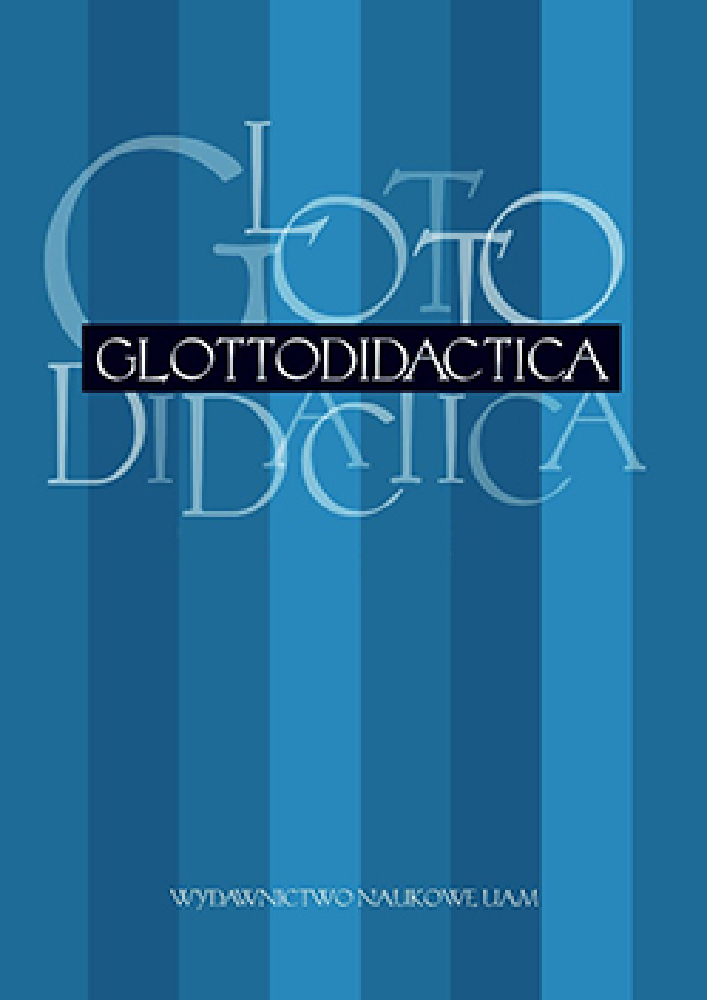Abstract
There is no doubt that the development of listening comprehension skills in foreign language learning is one of the least understood, least researched and yet, most important areas of foreign language teaching. In the light of this, the article aims to examine the usage and role of Podcasts in comparison with other didactic listening materials. The paper concludes with the discussion of possible technical and learning potential of podcasts for designing integrative training of listening comprehension.Literaturhinweise
Adamczak-Krysztofowicz, S./Stork, A., im Druck. Podcastgestützte integrative Hörverstehensentwicklung in universitären Sommerdeutschkursen. In: Tagungsband der 36. Jahrestagung des Fachverbandes Deutsch als Fremdsprache 2008 in Düsseldorf.
Burger, G., 2004. Webradio (Streaming Audio) - eine neue Ressource für das Hörverstehenstraining. In: Neusprachliche Mitteilungen aus Wissenschaft und Praxis 5 7 /4 , 229-233.
Burger, G., 2006. Das Internet als Quelle für Hörtexte: Webradio, Audio-on-Demand, Podcasting. In: U.O.H. Jung in Zusammenarbeit mit H. lung (Hrsg.), Praktische Handreichung für Fremdsprachenlehrer. Frankfurt am Main u.a., 308-312.
Eimeren, B. van/Frees, B., 2007. Internetnutzung zwischen Pragmatismus und YouTube--Euphorie. In: Media Perspektiven 8,362-378.
Eimeren, B. van/Frees, B., 2008. Internetverbreitung: Größter Zuwachs bei Silver-Surfern. In: Media Perspektiven 7, 330-344.
Gscheidle, C./Fisch, M., 2007, Onliner 2007. Das „Mitmach-Netz" im Breitbandzeitalter. PC-Ausstattung und formen aktiver Internetnutzung: Ergebnisse der AD/ZDF-Online-Studie 2007. In: Media Perspektiven 8, 393-405.
Horn, D./Fiene, D., 2007. Das Podcast-Buch. Das Radio des Web 2.0. Poing.
Jung, U.O.H., 2002. Medien im Fremdsprachenunterricht - Wozu braucht man sie eigentlich? In: Fremdsprachen und Hochschule 66, 7-44.
Kahlden, U. von, 2005. Hörverstehen und kritische Medienkompetenz. In: Der fremdsprachliche Unterricht Spanisch 8, 48-50.
Kraus, A., 2008. Podcasts: c'est un loyer correct! Mit www.arteradio.com Kompetenzen integrativ schulen. In: Der fremdsprachliche Unterricht. Französisch 95, 20-23.
Martens, D./Amann, R., 2007. Podcast: Wear-out oder Habitualisierung? In: Media Perspektiven 11, 538-551.
Medienpädagogischer Forschungsverbund Südwest, 2006. JIM 2006. Jugend, Information, (Multi-) Media. Basisstudie zum Medienumgang 12- bis 19-Jähriger in Deutschland. Stuttgart.
Peuschel, K., 2007. Kommunikation und Teilhabe. Wie Deutschlernende in Radio- und podcast-Projekten zu medial präsenten Sprachnutzenden werden. In: Deutsch als Zweitsprache 2, 33-41.
Rodier, C., 2004. L'internet: une aide à la compréhension orale au niveau débutant et élémentaire. In: Münchow, S. (Hrsg.), Computer, Internet & Co. im Französischunterricht. Berlin, 154-189.
Sankofi, M., 2008. „Den Podcast ins Klassenzimmer tragen". Eine Einführung und praktische Unterrichtsbeispiele. In: ide. Informationen zur Deutschdidaktik 3 2 /1 ,85-91.
Schmidt, T., 2008. Junk Food - I'm Loving It? Eine Talkshow als Podcast produzieren. In: Der fremdsprachliche Unterricht. Englisch 96, 29-35.
Waas, L./Parr, R.J., 2006. The CD or Me? Was sich Lehrkräfte immer fragen sollten. In: Grundschulmagazin Englisch 4/6,6.
Werres, W., 2006. Generation Download: Wie sich MP3-Player auf die Radionutzung auswirken. TNS Infratest 2006. In: http://www.medientage.de/mediathek/archiv/2006/Werres_ Wolfgang.pdf; heruntergeladen am 02.08.2008.
Wunschei, A., 2007. Die deutschen Podcast-Hörer. Zusammenfassung der Ergebnisse und Erkenntnisse der zweiten Podcastumfrage im Rahmen der Studienerstellung über sozio-demographische Merkmale und Nutzungsdaten von Podcast-Hörern. In: ht tp: //www.wunschel.net/p od ca s t/Podcastumfrage_2_Ergebnisse_Erkenntnisse.pdf; heruntergeladen am 02.08.2008.
Lizenz
Authors
Authors of texts accepted for publication in Glottodidactica are required to complete, sign and return to the editor's office the Agreement for granting a royalty-free license to works with a commitment to grant a CC sub-license.
Under the agreement, the authors of texts published in Glottodidactica grant the Adam Mickiewicz University in Poznań a non-exclusive, royalty-free license and authorize the use of Attribution-NoDerivatives 4.0 International (CC BY-ND 4.0) Creative Commons sub-license.
The authors retain the right to continue the free disposal of the work.
Users
Interested Internet users are entitled to use works published in Glottodidactica since 2016, under the following conditions:
- attribution - obligation to provide, together with the distributed work, information about the authorship, title, source (link to the original work, DOI) and the license itself.
- no derivatives - the work must be preserved in its original form, without the author's consent it is not possible to distribute the modified work, such as translations, publications, etc.
Copyrights are reserved for all texts published before 2016.
Miscellaneous
Adam Mickiewicz University in Poznań retains the right to magazines as a whole (layout, graphic form, title, cover design, logo etc.).
